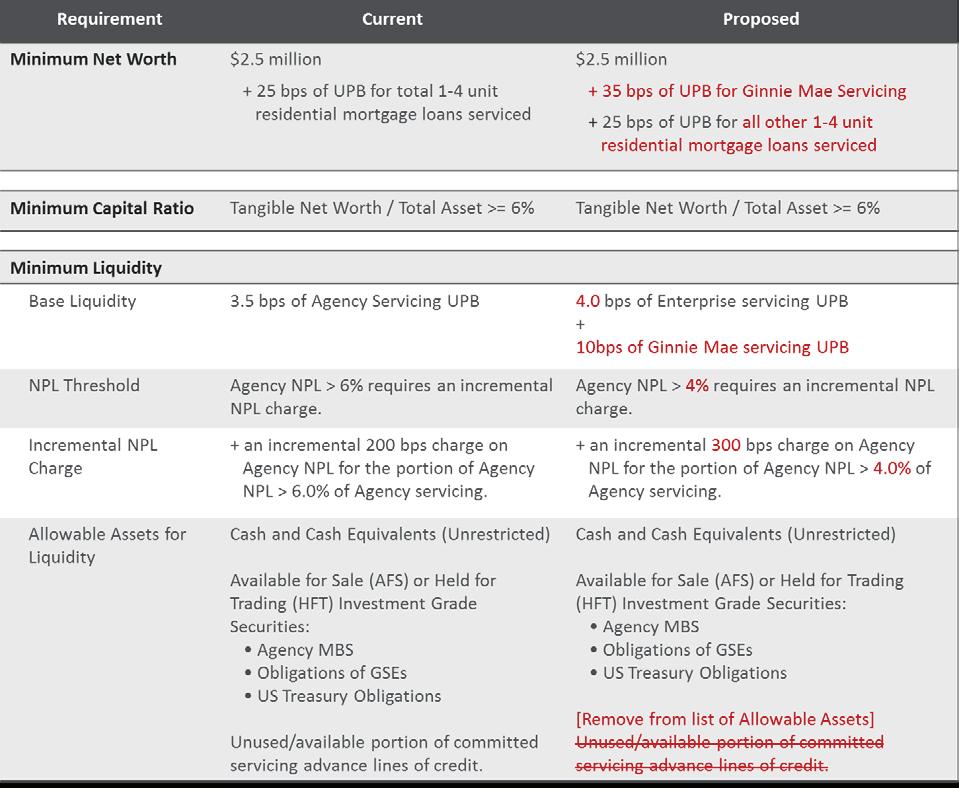
6 minute read
FHFA Proposes Updated Minimum Financial Eligibility Requirements for Fannie Mae and Freddie Mac Seller/Servicers
The Federal Housing Finance Agency (FHFA) has proposed updated minimum financial eligibility requirements for Fannie Mae and Freddie Mac Seller/Servicers.
The updated minimum financial requirements will further strengthen the Enterprises' Seller/Servicer requirements and provide transparency and consistency of capital and liquidity required for Seller/Servicers with different business models. A key improvement from the minimum financial requirements established in 2015 is that the new Enterprise standards establish financial requirements for the servicing of Ginnie Mae mortgages.
FHFA is releasing the proposed requirements to provide transparency and consistency to industry participants and other stakeholders. FHFA and the Enterprises will engage with servicing industry participants, regulators and other stakeholders to obtain their feedback. FHFA will receive input on these requirements for 60 days at ServicerEligibility@fhfa.gov.The 60-day period will end on March 31.
After reviewing industry and stakeholder feedback, FHFA anticipates finalizing these requirements in the second quarter of 2020, and anticipates that the requirements will be effective six months after they are finalized.
Below are some frequently asked questions about the updated minimum financial eligibility requirements for Fannie Mae and Freddie Mac Seller/Servicers:
FREQUENTLY ASKED QUESTIONS: UPDATED ELIGIBILITY REQUIREMENTS FOR ENTERPRISE SINGLE-FAMILY SELLER/SERVICERS
1.
W HY ARE THE E NTERPRISES UPDATING THEIR MINIMUM FINANC IAL ELIGIBILITY REQUIREMENTS FOR S INGLE -F AMILY S ELLER /S ERVICERS ?
The updated financial requirements further improve Seller/Servicer standards and provide transparency and consistency of the capital and liquidity required for Seller/Servicers with different business models. A critical improvement from the minimum financial requirements established in 2015 is addressing the risk factors related to servicing Ginnie Mae mortgages. The updated requirements improve the safety and soundness of the Enterprises by strengthening Seller/Servicer counterparties in the event of an economic downturn.
2.
W HAT HAS CHANGED FROM IS SUED IN 2015? THE MINIMUM FINANCI AL EL IGIBILITY REQUIREMEN T S

3.
W HEN WILL THE UPDATED MINIMUM FINANCIAL R EQUIREMENTS FOR E NTERPRIS E S ELLER /S ERVICERS BE EFFECTIV E ?
FHFA anticipates finalizing these requirements in the second quarter of 2020 and anticipates that the requirements will be effective six months after they are finalized. Enterprise Seller/Servicers must fully comply with all components of the minimum financial requirements by the effective date. Seller/Servicers that do not comply with the updated minimum financial requirements as of the effective date may be considered for a transition period, subject to the Enterprises’ discretion.

4.
W HAT IF A S ELLER /S ERVICER IS UNABLE TO R EQUIREMENTS ? MAINTAIN THE MINIMU M FINANCIA L
Consistent with current practice, if a Seller/Servicer does not maintain compliance with the minimum financial requirements, the Enterprises will have the discretion to take appropriate action. A Seller/Servicer should contact its Enterprise customer account manager to discuss this question further.
5.
H OW FREQUENTLY WILL C OMPLIANCE OF THE MIN IMUM FINANCIAL REQ UIREMENTS BE TESTED ?
Seller/Servicer compliance with the minimum financial requirements will be reviewed on a quarterly basis by the Enterprises.
6.
W ILL S ELLER /S ERVICERS ENGAGED IN SERVICING TRANSFERS BE REQUIRED TO BE IN IMMEDIATE COMPLIAN CE WITH THE NEW MINIMUM REQUIREMEN TS AFTER THE EFFECTIVE DATE ?
Yes. The Enterprises will continue to assess whether both the Transferor and the Transferee Servicer meet the minimum requirements as a result of the transaction in addition to other requirements.
7.
C OULD S E LLER /S ERVICERS HAVE FINANC IAL REQUIREMENTS IN EXCESS OF THE NEW MINIMUM FINANCIAL RE QUIREMENTS ?
Yes, the Enterprises may institute requirements beyond the minimum financial requirements for certain Seller/Servicers due to situations including but not limited to overall complexity, or other evidence of heightened risk embedded in the business model or financial condition.
8.
D O THESE NEW MINIMUM FINANCIAL REQUIREMEN TS ESTABLISH A REGUL ATOR Y S TANDARD FOR NON - DEPOSITORY S ELLER /S ERVICERS ?
No. These are new minimum financial requirements for approved non-depository Seller/Servicers to engage in business with the Enterprises. Financial regulatory requirements for non-depository Seller/Servicers are the responsibility of applicable regulators.

9.
A RE DEPOSITORY INSTIT UTIONS TESTED AGAINS T THE NEW MINIMUM LI QUIDIT Y S TANDARDS ?
No. Depository institutions have existing regulatory liquidity requirements that the Enterprises will continue to use in assessing financial eligibility. Therefore, only non-depository institutions will be tested against the new liquidity requirements.
10.
W ILL SUBSERVICED LOAN S BE INCLUDED IN THE FINANCIAL R EQUIREMENTS ? SUBSERVICER ’ S MINIMUM
No. The requirements apply to loans where the Servicer serves as Master Servicer. Loans that are subserviced are not applied to either the capital or liquidity requirement, however a subservicer must be an Enterprise-approved servicer. All Enterprise-approved Servicers must meet the minimum net worth and tangible capital ratio requirements.
11.
12.
13.
I S THERE AN EXCEPTION REQUIREMENTS ? PROCESS TO THE NEW MINIMUM FINANCIAL
The Enterprises may review Seller/Servicer requests and make exceptions where warranted.
W HAT IS THE IMPACT OF THE UPDATED MINIMUM FINANCIAL REQUIREMENTS M SR VALUES AND S ERVICERS ’ WILLINGNESS TO GROW THEIR SERVICING PORTFOLIOS ? ON
The Enterprises carefully considered these impacts and believe the requirements are appropriate and provide the right balance between managing counterparty risks and encouraging investments in the servicing business.
I S THERE A DIFFERENTI ATION IN THE MINIMUM LIQUIDITY REQUIR EMENT BETWEEN REMITTANCE TYPES ?
No. Presently, there is not a differentiation in the minimum liquidity requirement between scheduled and actual remittance types although the Enterprises will continue to evaluate the requirement on an ongoing basis to determine whether a differentiation should be made.
14.
15.
W HAT WILL HAPPEN IF G INNIE M AE CHANGES ITS ISSUE R / SERVICER LIQUIDITY O R CAPITAL REQUIREMENTS ?

FHFA will work with the Enterprises to reevaluate the Servicer Eligibility component that pertains to Ginnie Mae servicing portfolio, and issue changes where appropriate.
W HAT SHOULD A S ELLER /S ERVICER DO IF IT HAS ADDITIONAL QUESTION S ABOUT THE PROPOSED MINIMUM FINANCIAL REQUIREME NTS ?
FHFA and the Enterprises will conduct outreach with industry trade associations, regulators, a representative group of Seller/Servicers, and other stakeholder groups as appropriate. Seller/Servicers should forward any inquiries to its customer account manager at either Enterprise, or send inquiries to ServicerEligibility@fhfa.gov.
DEFINITIONS
ENTERPRISES – Fannie Mae and Freddie Mac
AGENCY SERVICING – the aggregate UPB (unpaid principal balance) of single-family mortgages serviced for Freddie Mac, Fannie Mae, and Ginnie Mae by the Seller/Servicer
LIQUIDITY – includes the sum of:
a) Cash and Cash Equivalents (Unrestricted) b) Available for Sale (AFS) or Held for Trading (HFT) Investment Grade Securities: • Agency MBS • Obligations of GSEs • US Treasury Obligations
NON-PERFORMING LOANS – includes loans 90 or more days delinquent and loans in the foreclosure process
SERVICING UPB – UPB of single-family residential mortgages serviced by the Seller/Servicer
TANGIBLE NET WORTH – total Equity Capital as determined by Generally Accepted Accounting Principles (GAAP), less goodwill and other intangible assets (excluding mortgage servicing rights), and a deduction of “affiliate receivables” and “pledged assets net of associated liabilities”
Exclusive Fraud Awareness and Prevention Training Designed not only for Underwriters and QC staff, but for production and support teams that are often in the best position to detect and prevent fraud. A deeper dive than most fraud training with actionable recommendations

22% of fraud events cost >$1 million, can you afford it? Dozens of mortgage lenders caught up in recent California employment scams; fraudsters becoming more sophisticated, are you prepared? Anti-Fraud training is proven to increase prevention and detection - 60 - 90 minute sessions delivered onsite or by webinar - Detailed mortgage case studies - Tailored to your Anti-fraud and AML requirements - Includes exclusive Fraud Finder Tool™ shown above - Immediate payback realized from better red flag management - Led by former Fannie Mae head of QC and Certified Fraud Examiner(CFE)








